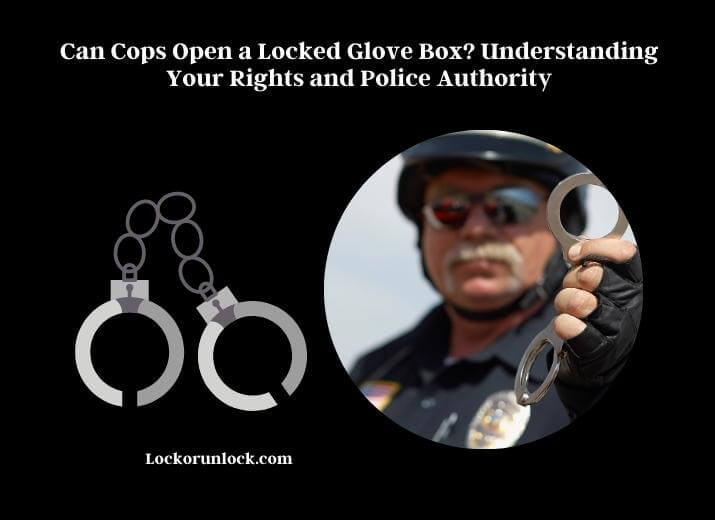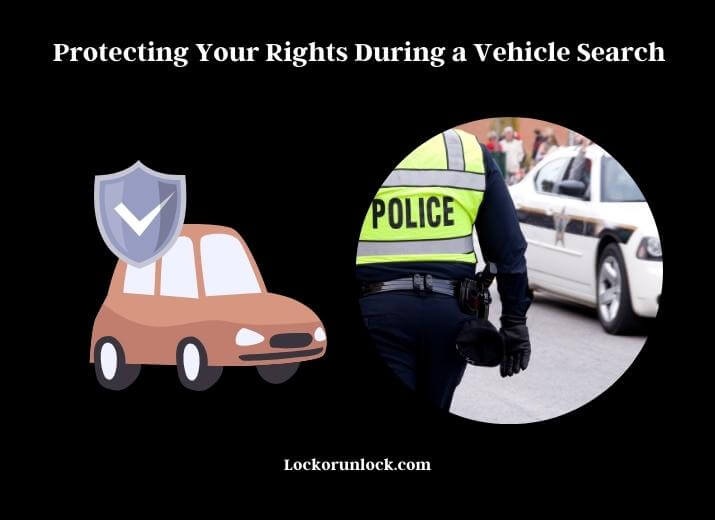Imagine you’re driving down the road, and you suddenly see those dreaded flashing lights in your rearview mirror. You pull over, and the police officer approaches your vehicle. What happens next could depend on your knowledge of your rights and the limits of police authority. One question that often arises in such situations is whether cops can open a locked glove box. Read the whole article for details information.

Legal Basis for Police to Search a Vehicle
The Fourth Amendment to the U.S. Constitution
The Fourth Amendment to the United States Constitution protects citizens from unreasonable searches and seizures by the government. It states that a warrant must be obtained for a search, based on probable cause, and must describe the place to be searched and the items or persons to be seized. However, there are exceptions to the warrant requirement.
Probable Cause and the Automobile Exception
One of the main exceptions to the warrant requirement is the automobile exception. This exception allows police to search a vehicle without a warrant if they have probable cause to believe that the vehicle contains evidence of a crime. The rationale for the automobile exception is that vehicles are mobile, and evidence could be moved or destroyed if the police had to wait for a warrant.
Consent to Search a Vehicle
Another way police can search a vehicle without a warrant is if the owner or person in control of the vehicle consents to the search. Consent must be given voluntarily and not coerced or manipulated by the police officer.
Inventory Searches
Inventory searches are another exception to the warrant requirement. Police may conduct an inventory search of a vehicle that has been impounded or is in police custody to protect the owner’s property, ensure officer safety, and prevent false claims against the police.
Can Cops Open a Locked Glove Box?
Circumstances Where Police May Open a Locked Glove Box
With a search warrant: If the police have a valid search warrant that includes the glove box, they can legally open it.
When probable cause exists: If the police have probable cause to believe that the locked glove box contains evidence of a crime, they can open it under the automobile exception.
During a lawful arrest: If you’re arrested and your vehicle is being searched as part of the arrest, the police may be able to open the locked glove box if they believe it contains evidence related to the arrest.
With the owner’s consent: If you voluntarily give the police permission to search your vehicle, including the locked glove box, they can legally open it.
Circumstances Where Police Cannot Open a Locked Glove Box
During a routine traffic stop without probable cause: In the absence of probable cause, a locked glove box cannot be opened during a routine traffic stop.
In the absence of a search warrant or other exceptions: If there’s no search warrant or other applicable exceptions, the police cannot legally open your locked glove box.
If the owner explicitly denies consent: If you refuse to give consent for the police to search your vehicle, they cannot legally open the locked glove box without a warrant or probable cause.
Protecting Your Rights During a Vehicle Search

How to Interact With Law Enforcement Officers?
Remain calm and respectful: Treat the officer with respect and comply with their requests for documentation, such as your driver’s license, registration, and insurance.
Provide necessary documentation: Provide the required documents promptly and politely.
Clearly and politely assert your rights: If the police ask to search your vehicle, you can calmly and respectfully assert your rights by saying something like, “I do not consent to a search of my vehicle.”
Can Police Officers Help in Unlocking House Doors?
Police officers are trained in various skills, and one area where they can provide valuable assistance is during lockouts. When individuals find themselves unable to access their homes due to lost keys or malfunctioning locks, seeking police assistance for lockouts can be a practical solution. With their expertise and tools, officers can often help in unlocking house doors swiftly and efficiently, ensuring quick access and peace of mind for homeowners.
When to Deny Consent for a Search
If you have not been presented with a search warrant and do not believe that probable cause exists for a search, you have the right to deny consent. Remember that consenting to a search could result in the discovery of evidence that may be used against you in court.
Seeking Legal Counsel if Your Rights Are Violated
If you believe that your rights have been violated during a vehicle search, it’s essential to seek legal counsel as soon as possible. An experienced attorney can review the details of your case and advise you on the best course of action.
If you want to know about smart locks, read here for details.
Final Verdict
Understanding your rights and the limits of police authority is crucial when it comes to interactions with law enforcement, especially during vehicle searches. To recap, police can legally open a locked glove box under certain circumstances, such as with a search warrant, when probable cause exists, during a lawful arrest, or with the owner’s consent.
They cannot open a locked glove box during a routine traffic stop without probable cause or if the owner explicitly denies consent. Always remain calm and respectful during your interactions with police, provide the necessary documentation, and assert your rights when necessary. If you believe your rights have been violated, seek legal counsel to help you navigate the situation. Stay informed and empowered by knowing your rights and the limits of police authority.
